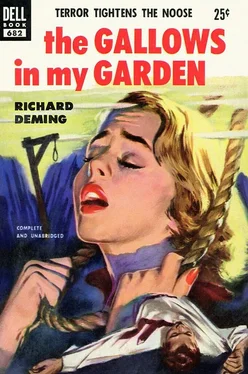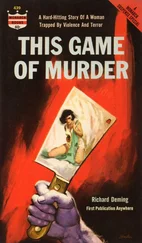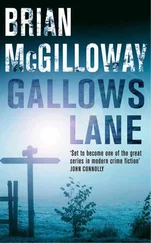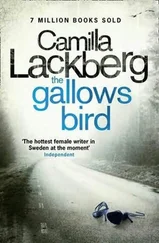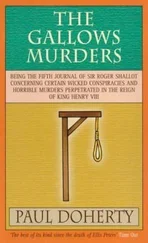“Did she ever bother to look you up when you were poor?” I asked.
Ann spread her eyes in surprise. “No, but she isn’t like that at all. She wasn’t even in this country then, you see, and my marriage to Donald had nothing to do with her return. She had become quite well known as a painter and was having an exhibition in New York. The German occupation had soured her on France, so when she got back to this country, she decided to stay. She certainly didn’t look me up because she thought I had money. She visited all four of my brothers, too, and while all of them have done fairly well, none is even faintly wealthy.”
“How’s it happen none of your brothers visit you on week-ends?” I asked. “Everyone else seems to use the place like a hotel.”
“They don’t live here. Two are in Detroit, one in New York, and the married one lives in Chicago.”
“That explains that,” I said. “It’s been bothering me ever since you mentioned your brothers. Isn’t Miss Stoltz your sole heir?”
Ann shook her head. “Not since this morning. Because of the way Donald drew up his will, I really hadn’t much of my own — too little to divide among four brothers really — so I had Aunt Abigail made my beneficiary. But after you and Grace left Sunday, Jonathan pointed out that if both Grace and I died suddenly, the whole Lawson estate would fall to Aunt Abigail. He suggested I change my will with that eventuality in mind, and after some discussion I asked him to draw up a new one leaving Abigail two thousand dollars — about what she would have gotten under the original will — and the residue divided equally between my four brothers and Douglas. That’s the paper Jonathan brought me to sign this morning.”
After digesting this, I asked, “Does your aunt know of this change?”
“She was present when it was signed. I used your friend, Miss Moreni, as a witness.”
“Which doesn’t leave much motive for Aunt Abigail,” I decided. “Let’s go on to Doctor Lawson.”
A faint flush suffused Ann’s cheeks, just as it had when I paused before asking about Mannering.
“After Douglas’s public announcement, discussing him as a murder suspect is going to be somewhat embarrassing,” she said. “I’m afraid I’m prejudiced enough in his favor to refuse even to entertain the idea he might be guilty, so I’ll probably make a poor witness.” She paused to look at me frankly. “As a matter of fact, since he told everyone we plan to be married, there’s no point in hiding that I think I’m in love with him.”
“You think?”
She bit her lip. “I mean I am in love with him.”
“Why did you say ‘think’?” I asked curiously.
For a long time she did not answer. Then she said, “Shyness, I suppose. It’s rather difficult to tell a man you don’t know very well you’re in love with another man. For me, anyway. I’m really quite certain, I think—” An expression of chagrin formed on her face. “I didn’t mean that second ‘I think.’ See, you have me flustered. Can’t we talk about Arnold Tate first?”
“No,” I said. “Let’s dispose of the doctor.”
“Well,” she said reluctantly. “Douglas was the second of three boys, and Donald was the oldest. Both their parents and the youngest son died in the influenza epidemic during World War I, when Donald was fifteen and Douglas seven. Their father carried a little insurance and owned a drugstore, so they weren’t left destitute.
“Old Abel Mannering, Jonathan’s father, was executor of the estate — the firm didn’t restrict its clients to million-dollar corporations in those days — and had himself appointed guardian. The old Lawson house, the same one Donald and I lived in when we were first married, was rented, and the two boys moved into the Mannering home.
“Two years later Donald graduated from high school and went to work in the drugstore. The store hired a registered pharmacist who was also supposed to be its manager, but apparently he wasn’t a very forceful man, for within a year Donald was actually running the store, though he was then only eighteen. Donald seemed to have an instinctive knack for what he always called ‘merchandising,’ and by the time he was twenty-one he had developed his father’s store from a musty old-fashioned pharmacy into a modern cut-rate drugstore which was slowly driving the other two pharmacies in the neighborhood out of business.
“Donald never got on too well with old Mr. Mannering, though he always liked Jonathan, so when he came of age, he somehow managed to have himself declared Douglas’s guardian, evicted the tenants from his house, and moved himself and Douglas into it. That same year he bought out one of the stores whose business he had stolen, which started the Lawson chain. Ten years later the chain covered the state and twenty years later spread all over the nation.”
Ann stopped, as though in puzzlement. “I don’t seem to be telling much about Douglas, do I?”
“No,” I said. “But it’s all background. Keep it up.”
“Well—” She hesitated, collecting her thoughts. “Donald married, and his wife bore the two children — I still seem to be on Donald, but he played such an important part in Douglas’s life, there isn’t much story without him. Donald rather spoiled Douglas, you see, or at least tried to. I never knew anyone as fond of a younger brother as Donald was of Douglas. He treated him like a pampered son rather than a brother. Never allowed him to work as he had, sent him through medical school and then on for graduate work in psychiatry — Douglas decided he didn’t like psychiatry after wasting a year, and went into general practice, after all — set him up in practice, and in general behaved like a doting father. It’s really amazing Douglas turned out as unspoiled as he did.”
She stopped suddenly, as though run down.
“So go on,” I said.
“That’s all there is.”
“Now wait a minute,” I said. “You’ve just got Douglas out of school and in practice. Bring him up to the present.”
The half-puzzled frown reappeared on her face. It was a frown of wonderment as much as puzzlement, as though she suddenly realized she knew less than she had thought about the man she intended to marry.
“There really isn’t much more to tell,” she said slowly. “I’ve known Douglas ten years, and he’s always been charming and witty and a trifle mocking, as though everyone else was put on earth for his personal amusement. No, that isn’t fair. He’s not in the least snobbish. He just seems to enjoy life in a rather carefree manner, and he’s inclined to be a bit of a tease. But he has a serious side, too. He’s quite a good physician, for example, and has an excellent practice which he neglects only on week-ends — and today, because of the funeral.
“As far as sketching his history during the ten years I’ve known him, absolutely nothing of any importance has happened. He was practicing medicine when I married Donald, and he still is. He lived in the same apartment then and visited here every week-end — at least since we moved here five years ago — just as he does now. What else is there to tell?”
“This is a little personal,” I said, “but how long have you been secretly engaged?”
“About three months.” Unaccountably she flushed deeply. “Perhaps that seems premature with Donald dead not quite a year, but we originally planned to hold the announcement until the year was up.” For some reason she seemed to feel she had to justify herself. “Outwardly we have obeyed all the proprieties, even tacitly agreeing not to discuss marriage plans in private until the year was up. But you can’t set a timing device on your emotions as you can on your actions.”
I asked, “How long before your actual understanding had Doctor Lawson been carrying this secret love in his heart?”
Читать дальше
